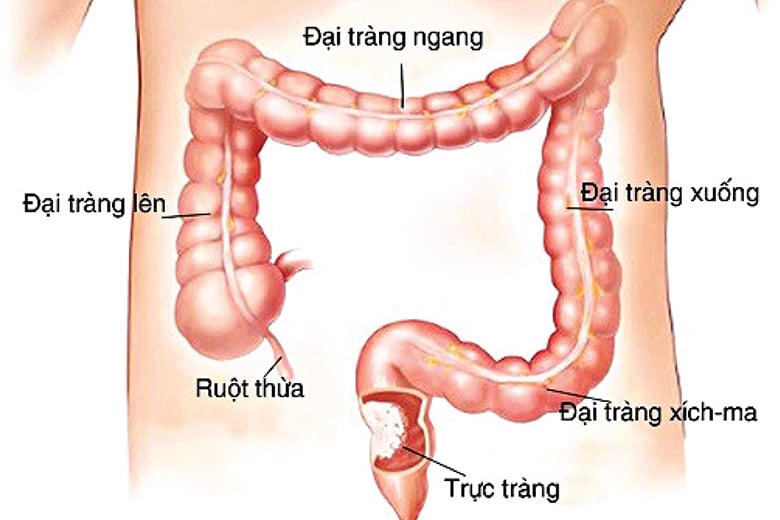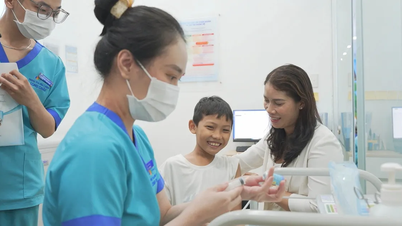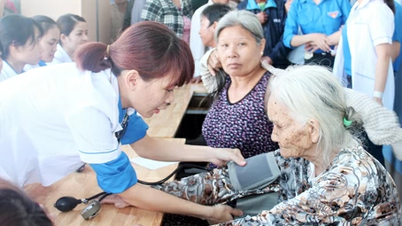Colorectal cancer is one of the most common cancers and has a high mortality rate. However, colorectal cancer can also be treated and cured in more than 90% of cases if detected and treated early.
Therefore, early screening to detect the disease is extremely important.
Causes of colorectal cancer
The exact cause of colorectal cancer is unknown, however, there are several factors that can increase the risk of this disease, including: Older age, male gender, diet high in fat and meat, low in fiber, obesity, smoking, colon polyps, ulcerative colitis or Crohn's disease, family history of colorectal cancer.
Signs of colorectal cancer
Colorectal cancer in its early stages may have no symptoms at all. As the tumor grows, some of the following symptoms may be noticed:
- There is a change in bowel movements, abnormal stools.
- Frequent pain or cramping in the intestines due to gas, or a feeling of fullness or bloating in the abdomen.
- Unexplained weight loss, body fatigue.
Persistent changes in bowel movements (diarrhea or constipation) Discomfort or discomfort in the bowel Blood in the stool (bright red or dark).
Diagnosis of colorectal cancer
Colonoscopy is the most important test when colon cancer is suspected. Through colonoscopy, the doctor can know the relative location and size of the tumor and take a biopsy to diagnose with certainty whether the tumor is cancerous or not.
In addition, patients need to undergo some other imaging and testing such as: computed tomography (CT Scan), abdominal ultrasound, chest X-ray, electrocardiogram, blood test... to help accurately diagnose the stage for treatment.

Colorectal cancer images.
Who needs colorectal cancer screening?
Early stage colorectal cancer often has no symptoms or vague symptoms, easily confused with other diseases. However, if the disease is not detected early, the patient's treatment opportunities will decrease. Therefore, everyone needs to proactively screen and have regular health check-ups to detect the disease early, especially for those at risk.
- According to the recommendation from the American Cancer Society, people over the age of 30, both men and women, especially those with relatives with colorectal cancer, should have a colonoscopy every 5 years. If colon polyps are detected, they should be removed to prevent cancer.
- When symptoms appear: rapid weight loss, abdominal pain, bloating, loose stools, bloody stools... a stool blood test can be performed. If positive, a complete colonoscopy will be performed.
- In addition, we should do a stool test every year to look for red blood cells in the stool (by taking 2 stool samples at 2 times and sending them to the hospital). If the test is positive, showing the presence of microscopic red blood cells in the stool (the type of red blood cells that cannot be seen with the naked eye), a colonoscopy should be performed immediately because this can be a symptom of early colon cancer.
- Subjects with high risk factors and the following characteristics: at least 3 adenomas; at least 1 adenoma larger than 1cm; papillary or tubular adenomas; adenomas with high-grade dysplasia; serrated polyps larger than 1cm.
- The time for re-endoscopy may be shorter if the quality of the previous endoscopy is poor or if there are high-risk signs or certain characteristics of the previous endoscopy: incomplete polypectomy, patient condition, medical history.
- Follow-up endoscopy within 1 year if the patient has at least 5 adenomas.
- Colorectal cancer patients who have undergone surgery
- Patients who have not had a complete colonoscopy before surgery, for example: surgery due to intestinal obstruction, should have a colonoscopy again after 3-6 months.
- If the patient had a colonoscopy, the entire colon before surgery, it should be repeated after 1 year: if the results are normal, it should be repeated after 3 years. If the results of the second colonoscopy are normal, it should be repeated every 5 years.
- Regular CEA test every 3-6 months for 2 years, then every 6 months for 5 years. Chest, abdomen and pelvis CT scan every year for 5 years.
- Screening in special populations
- People with a family history of colorectal cancer and colorectal polyps should have a screening colonoscopy at age 40.
- Familial adenomatous polyposis (FAP): Colonoscopy every 1-2 years starting at age 10 and continuing in those carrying the mutated gene. Gastroscopy screening is required when colon polyps appear or at age 25-30.
- Lynch syndrome (Hereditary nonpolyposis colorectal cancer).
- Colonoscopy every 1-2 years, at age 20-25.
- Gastroscopy from age 30 repeat every 2-3 years.
- Inflammatory bowel disease (IBD including ulcerative colitis and Crohn's disease), Peutz Jegherz syndrome, Juvenile polyposis syndrome (JPS), Serrated polyposis syndrome (SPS): Colonoscopy every 1-3 years.
In summary: Colorectal cancer is a common cancer with a high rate in Vietnam and the world. Screening and early detection play an extremely important role in helping to effectively treat and improve the quality of life for patients, thereby reducing the psychological, economic , and social burden.
Early screening for cancers in general and colorectal cancer in particular helps detect the disease at an early stage, bringing high efficiency in treatment.
Source: https://giadinh.suckhoedoisong.vn/ung-thu-dai-truc-trang-ai-can-tam-soat-som-17224121815591771.htm



![[Photo] Vietnamese and Hungarian leaders attend the opening of the exhibition by photographer Bozoky Dezso](https://vphoto.vietnam.vn/thumb/1200x675/vietnam/resource/IMAGE/2025/5/28/b478be84f13042aebc74e077c4756e4b)
![[Photo] 12th grade students say goodbye at the closing ceremony, preparing to embark on a new journey](https://vphoto.vietnam.vn/thumb/1200x675/vietnam/resource/IMAGE/2025/5/28/42ac3d300d214e7b8db4a03feeed3f6a)

![[Photo] General Secretary To Lam works with the Central Policy and Strategy Committee](https://vphoto.vietnam.vn/thumb/1200x675/vietnam/resource/IMAGE/2025/5/28/7b31a656d8a148d4b7e7ca66463a6894)
![[Photo] Prime Minister Pham Minh Chinh receives a bipartisan delegation of US House of Representatives](https://vphoto.vietnam.vn/thumb/1200x675/vietnam/resource/IMAGE/2025/5/28/468e61546b664d3f98dc75f6a3c2c880)




















































































Comment (0)